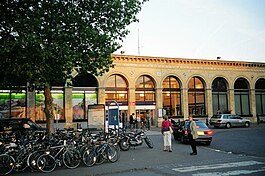Cambridge railway station
| Cambridge |
|
|---|---|

Cambridge railway station, front entrance
|
|
| Location | |
| Place | Cambridge |
| Local authority | City of Cambridge |
| Coordinates | 52°11′38″N 0°08′17″E / 52.194°N 0.138°ECoordinates: 52°11′38″N 0°08′17″E / 52.194°N 0.138°E |
| Grid reference | TL462572 |
| Operations | |
| Station code | CBG |
| Managed by | Abellio Greater Anglia |
| Number of platforms | 8 |
| DfT category | B |
| Live arrivals/departures, station information and onward connections from National Rail Enquiries |
|
| Annual rail passenger usage* | |
| 2011/12 |
|
| – Interchange |
|
| 2012/13 |
|
| – Interchange |
|
| 2013/14 |
|
| – Interchange |
|
| 2014/15 |
|
| – Interchange |
|
| 2015/16 |
|
| – Interchange |
|
| History | |
| Key dates | Opened 1845 |
| National Rail – UK railway stations | |
| * Annual estimated passenger usage based on sales of tickets in stated financial year(s) which end or originate at Cambridge from Office of Rail and Road statistics. Methodology may vary year on year. | |
|
|
|
| Railways around Cambridge | |
|---|---|
Cambridge railway station serves the city of Cambridge in eastern England. It stands at the end of Station Road, off Hills Road, 1 mile (1.6 km) south-east of the city centre. It is the busiest railway station in the East of England, used by almost 11 million passengers in 2015/16.
Several routes start at the station including the West Anglia Main Line to London Liverpool Street, the Fen Line to King's Lynn, the Breckland Line to Norwich, services to Ipswich on the Ipswich to Ely Line, and the Cambridge Line, heading southwards and following an alternate route, to London King's Cross, via Hitchin. These routes are electrified at 25 kV AC overhead, except for the Ipswich to Ely and Cambridge to Norwich lines, which are diesel-operated. The station has the third-longest platform in England on the national rail network. Ticket barriers are in operation.
In 1822 the first survey for a railway line in the Cambridge area was made and, in the 1820s and 1830s a number of other surveys were undertaken none of which came to fruition although the Northern and Eastern Railway had opened up a line as far as Bishop's Stortford by May 1842. The financial climate in the early 1840s ensured that no further scheme got off the ground, but by 1843, Parliament had passed an act enabling the Northern and Eastern Railway to extend the line to Newport (Essex). The following year, a further act was passed, extending the rights to build a railway through to Cambridge itself. In 1844, the Northern and Eastern Railway was leased by the Eastern Counties Railway, which built the extension.
...
Wikipedia
